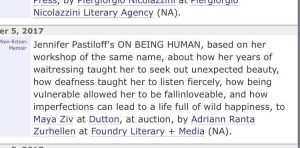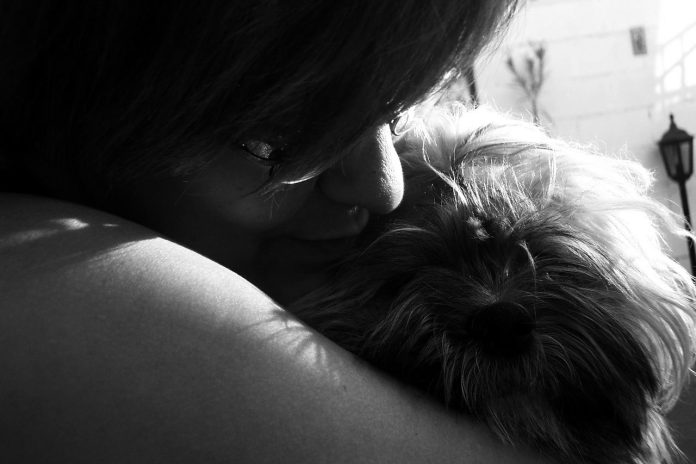By Jenna Clark Embrey
After a year and a half of dating, my boyfriend Steve and I decided to sign our first lease together and adopt a dog. It was the first time either one of us had lived with a significant other, and the idea of a pet went hand-in-hand with cohabitation in both our minds. This step forward felt like a promise, as if taking care of living thing together meant that we could tangle our lives together permanently. We had talked about marriage and children, but always in slightly dreamy, slightly ambivalent terms. I thought Steve’s enthusiasm to get a dog meant that his ambivalence had turned into something more concrete. It didn’t occur to me to ask him.
Steve and I first gravitated toward each other because of our similar natures. We were both relentless in our ambitions yet also deeply indulgent during our rare moments of relaxation. We loved margaritas and vodka sauce pizza and 24-hour news networks. We celebrated birthdays and holidays with day-long extravaganzas. From the earliest days of our relationship, we felt like a unit that was solid and sure. Steve and I wanted to widen this circle just a bit, just enough to include a creature with four legs.
When we went to an adoption event near our new home in Brooklyn, I saw a large black pitbull who was standing still while people and animals swirled around her. When we came up to pet her, she sat down on Steve’s feet, and the connection between the two of them was immediate. I felt in my gut that this was the right dog for us, and I told him so. Steve had always trusted my instincts. Two weeks later we brought the dog home. I suggested that we name her Roz Doyle, after the character on the 90s sitcom Frasier, which I had been recently binge-watching on Netflix. Our Roz quickly revealed to us that her favorite things were eating, running, and sleeping, which luckily mirrored our own priorities for relaxation.
In the first two months that we had Roz, I was overwhelmed by the responsibility of caring for a living creature. Her well being consumed my thoughts, but I was also taken over by a feeling of love unlike anything I had ever experienced. For someone who had always been a bit of a workaholic, and perhaps a bit self-absorbed, I had initially worried that I would resent a dog for taking me away from social events. I was shocked that I didn’t mind using her as an easy excuse to leave parties early. It was as if Roz had cured me from what had been, up to that point, a chronic “fear of missing out.”
Before Roz, I had always hated hanging out in the park; I found it boring and unstructured and I generally disliked the way grass felt on the back of my thighs. But once Roz came into my life, I accepted invitations from friends to lay out in Prospect Park for hours on end. Quiet Saturday nights on the couch with Roz’s sleeping head on my legs suddenly felt purposeful, and maybe a little altruistic. I was staying home for her, I told myself. I got a doggy-cam for the apartment and a GPS for her collar, both of which could be managed from a smartphone and shared between owners. Steve deleted the apps after a couple weeks, because the push notifications were annoying.
What Steve thought of as information overload, I saw as a reassurance that in my absence Roz was okay. I soon started referring to myself as Roz’s mom. Throughout my entire life, I had wanted children in the abstract, without any real thought or reason behind that instinct. But once I discovered that I actually had the capacity for this kind of selflessness, the desire felt urgent and visceral. It only took a few times of calling Steve “Dad,” before he asked me to stop.
“I’m Roz’s owner, not her father,” he said.
Steve was wonderful with Roz. He adored her and took care of her with a genuine tenderness and skill that made me breathless. But there was a disconnect in how we viewed our relationship with Roz, and it created a chasm between us.
As much as he loved Roz, Steve had discovered that he had a limit for how much of himself he could give over. I sensed it before he said anything. A few months after adopting Roz, on a particularly stressful day of coordinating schedules and time for dog-walking, he casually said “I think that having children is, maybe, not for us.” Steve sat at the kitchen counter eating a sandwich, his back turned to me.
I felt like my stomach had been hollowed out. I creaked out a “Yeah, okay,” before crawling into bed and crying until I fell asleep.
This next morning, I stared at Roz’s long, dark body on the too-small dog bed, and tried to discern the movement of her ribs and lungs. I went over and put my hand on her side and woke her up to make sure she was breathing. She startled awake, looked at me, and then immediately went back to sleep. I knew my compulsion to become a mother wasn’t going to go away just because I willed it to.
Sometimes Roz would let me wrap my whole body around her in a hug, and as I felt her warmth on my stomach, I wondered if that’s what it would feel like to carry a baby inside me. When the vet handed me the stethoscope during a routine check-up and asked if I wanted to listen, the sound of Roz’s heartbeat made me break down in joyous sobs. The only people that I felt would understand were mothers. I drove to Connecticut to visit my friend Amanda and her toddler and newborn. It was on a seaside run while her children napped that I confessed how alone I felt in my wanting, how my love for my dog made me want to call myself a mother. I told her how far that feeling made me feel from Steve. Where I had been previously bored by the quotidian talk of motherhood, I listened, rapt, as other mothers described their infants’ forays at daycare. If an acquaintance pulled up photos of their children on an iPhone, I immediately cued up photos of Roz for display. I was consumed by how my capacity for love had expanded, and how my need to care for Roz felt like an infinite, incredible fire.
“If Roz and I were both hanging off the edge of a cliff, equal distance from you, who would you save?” Steve jokingly asked me one day.
I hesitated. Too long. We laughed it off, uncomfortably.
It wasn’t that I valued her life over his in actuality. But in my mind, I had made a vow to protect Roz at all costs. It was my worrying for her that made me feel most like a mother. When walking her the morning after a particularly bad storm, I thought about how I would protect her if a tree branch came crashing down. I imagined the way I would curl my body around hers, bracing myself so that my back would absorb the impact and keep her safe. I started to understand why my mother always got nervous when her three children, even as adults, would ride in the same car together.
That same year, Steve and I stopped talking about the future. We didn’t plan vacations. We didn’t walk by beautiful Cobble Hill brownstones and talk about how we might live there one day, maybe. Another conversation about children went unspoken for more than a year. It felt like both the wisest and most foolish thing: to say goodbye to a wonderful relationship because of a baby that was still years away, and more hypothetical than not.
We broke up on Mother’s Day, when the mounting stress finally felt like it was going to shatter me. The conversation only took a few minutes. As soon as I began to speak, he understood. I thought maybe he hadn’t noticed how tormented I had become, but it turns out, he had been waiting for me to bring it up.
“You’re going to be a really amazing mother,” he choked out between tears. “You’re so good with Roz.” Until he said that, I hadn’t understood how much I needed to hear it from him.
I sent an email to my closest group of friends letting them know what had happened, and that Steve was moving out and I would be remaining in the apartment with Roz. I was surprised by their responses: “I’m so excited for you!” many of them said. Several of them expressed relief that I was finally going to let myself go after the thing I wanted, this imaginary baby that was, hopefully, somewhere in my future.
A few weeks later, I took Roz out on a run, as we had done hundreds of time before. But this time, I didn’t stop at our usual four or six miles. I jogged slowly and kept my eye on Roz, checking for signs of her exhaustion. She didn’t flag. We ran ten miles that day, her longest run ever.
When we got home, I sat on the kitchen floor and unhooked her leash. “It’s you and me for now, okay?” Roz met my eyes, and leaned her head into my lap. I could feel her heart beating. I felt such gratitude to this fifty pounds of fur, for making me realize what kind of life I wanted to go after. Roz had, in her own way, made an honest woman out of me.




